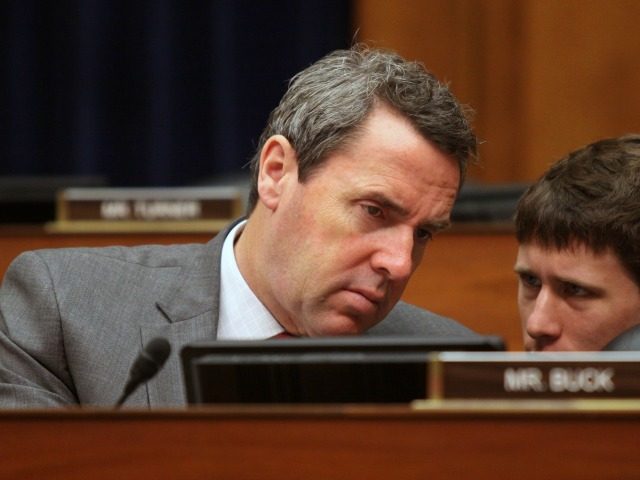The North Carolina congressman running for the chairmanship of the Republican Study Committee tells Breitbart News he is shocked that House Republicans are lining up to bring back earmarks, the Capitol Hill slang for when congressmen and senators compel spending on particular projects.
The GOP House banned the use of earmarks in a spending reform adopted in 2011.
“Donald Trump just led an historic victory, so to bring this up right now is just not the moment,” Rep. Mark Walker (R.-N.C.), says.
“This is an historic moment to have Republican control of House, Senate and presidency and I believe that the people, who came to the polls sent a clear mandate that they want change here in Washington–drain the swamp,” he said.
“We need to be talking about unifying and earmarks are another divisive issue,” he said.
Walker said down the road there could be a conversation about bringing back the practice that was formally banned by Speaker John Boehner in 2011 after more than two decades of campaigning.
“Let’s focus on the major things that the new Trump administration is talking about, like the repeal of Obamacare, tax reform–things we have been promising the American people, ” he said.
Walker said he is running to lead the Republican Study Committee because he wants to return the RSC to the days when it presented conservative ideas and voted as a bloc to push those agenda items.
The vote for RSC chairman is scheduled for Thursday and his chief opponent is Maryland’s Rep. Andy Harris.
Walker said his own count puts his support in the 60 to 70 vote range, but he still has to connect with congressmen, who in the middle of tough races, he was not able to make his pitch until Congress returned Monday.
“We got 30 or 40 that are undecided at this point,” he said.
Members, who are supporting him, are looking to make the RSC a platform for empowering them, he said.
“Conservatives want a place, where they can voice their concerns as opposed to being steamrolled sometimes, as happens around here–to be able to talk about why their issues matter,” he said.
“The RSC has been the policy think tank over the decades,” he said. “We have to make sure it is not a rubber stamp for just any idea, whether it comes out of the administration or if it comes out of leadership.”
Walker said the RSC should not be just reacting to ideas from other sources, rather as the bloc of House conservatives, with more than 170 members, the RSC should be setting the agenda on Capitol Hill.
“I believe that that is one of the ways the RSC can reclaim the mantle of conservatism,” he said.
Another function of the RSC should be preparing members for when leadership drops a surprise bill on the floor and demands quick action without time to read the bill or research its impact, Walker said.
In those cases, the RSC staff should be tracking what is coming and anticipate the surprises better, he said. “Let’s get out ahead of that.”
Although it is the largest voting bloc on Capitol Hill, the Republican Study Committee does not have its weight felt as it did one decade ago, when it was smaller and when it had its own whip system for rounding up votes. Typically, less than 80 RSC members vote with other conservatives against omnibus and other stop-gap government funding legislation outside the House’s regular order.
One of the challenging the RSC is its own membership, with congressmen seeking membership as a badge of conservatism for voters, but not seeing it as an obligation to support the RSC’s conservative agenda.
Walker told Breitbart News that he recognizes that the RSC may have to get smaller to get stronger as it lets go of less committed conservatives.
With just a slightly smaller membership, the RSC would be better able to focus its message and agenda, he said.
“We need to be able to streamline our message of history conservative ideology,” he said.
“You have to be able to set that agenda in a way that people understand no only where you are going, but why you are going to get there.”

COMMENTS
Please let us know if you're having issues with commenting.